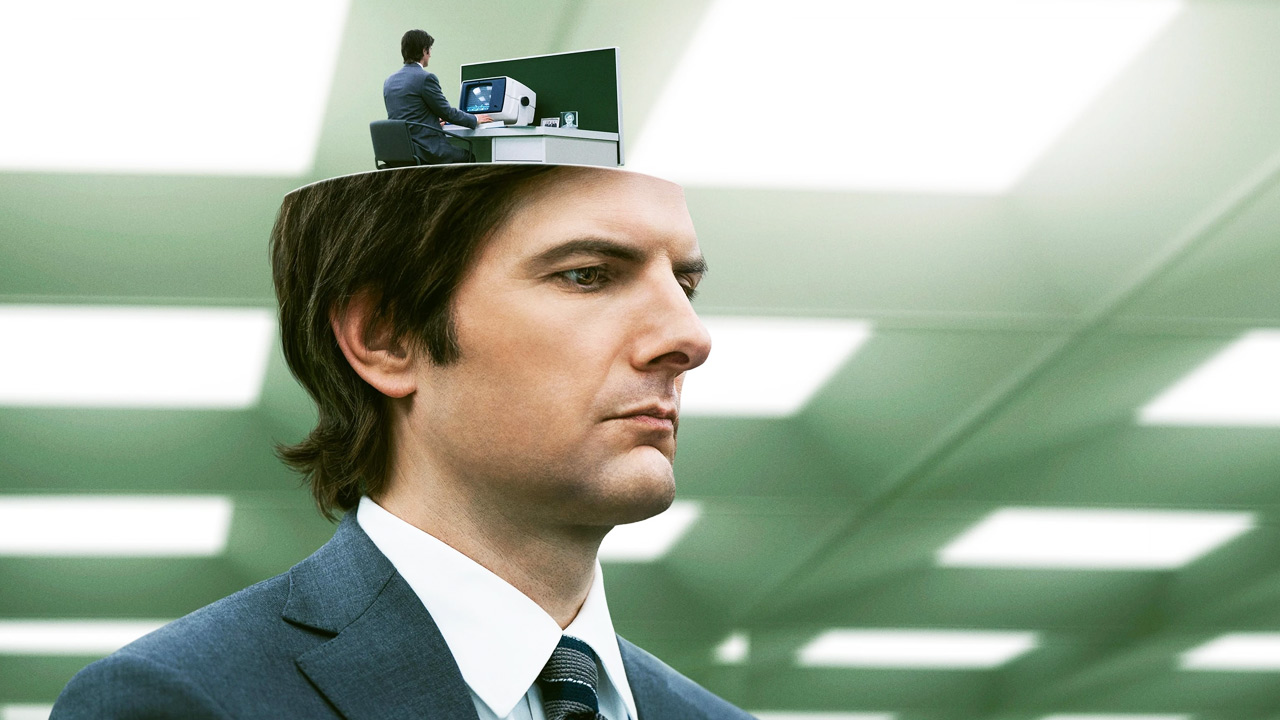Severance is a brilliantly original show about hating the hell out of your day job

Ever wondered what it would feel like to take acid and lock yourself in a boardroom? Look no further than Severance, a stunningly bold workplace thriller and satire, writes Luke Buckmaster.
The idea of returning home from your day job with no recollection of it—memories wiped by an Eternal Sunshine-esque deletion device—is a premise more compelling as a comment on existing office culture than a prophecy of the future. Mark (Adam Scott), the protagonist of creator Dan Erickson’s brilliantly bold and original new show Severance (directed by Ben Stiller and Aoife Mcardle), is among those who have chosen to be “severed” in a bizarro alternate reality, where he works for a company called Lumon as the Head of Macrodata Refinement. Whatever that is.
Mark manages three colleagues who also underwent the procedure: Irving (John Turturro), Dylan (Zach Cherry) and new recruit Helly (Britt Lower). Framed by cinematographer Jessica Lee Gagné in heavily symmetrical compositions, Lumon HQ is ultra modern and minimalist—the set design evoking the large sparse spaces in Playtime, the sterile rooms and corridors in THX: 1138 and the expansive central setting in the video game Control, based in a Brutalist skyscraper that seems to extend forever.
What Mark’s team actually do, and what the company does, wwweelllll, that’s a tough one—the show’s core mystery. Initially the characters don’t seem to care, but inch towards wanting to know more as the series evolves from absurd Kafkaesque-esque and Bunuellian satire to more a conventional (but still very compelling) thriller. Loaded with gobbledegook dialogue—which can sound like the characters are reading from instruction manuals (and sometimes they are!)—the writers do a great job making the office scenes interesting without revealing what on earth is really happening.
Mystery is created by focusing on dramatic minutiae and excluding context—like in Kafka’s novel The Trial, about a man arrested and prosecuted for a crime never revealed to himself or the reader. In that classic book and this instant-classic series we accept not only the reality of a bureaucracy-driven universe, full of its own lores and processes, but a framing of it that reduces perspective—allowing us to see the parts and never the whole. Terrifically well directed by Stiller (helming six episodes) and Mcardle (the remaining three), Severance is funny weird rather than funny ha-ha, with a thick, clogging atmosphere of very strange dread.
There are occasional wacky outbursts: for instance when Christopher Walken’s character, “Bert from Optics and Design,” strolls into the Macrodata Refinement quad and introduces himself, he’s greeted by Dylan with the exclamation: “exactly how the wet fuck do you know where this office is?” The building is maze, you see, used by the directors to visually illustrate the repetitiveness of humdrum workday life. One corridor leads into another, which eventually leads into a stairway, going nowhere other than the corridor, which goes back to the cubicle…and around we go, like a hamster on a running wheel.

An excellent companion piece, swapping office for home, is the 2019 film Vivarium: another production that bakes visual monotony into its premise, combining a bad trip with unrelenting aesthetic and physiological emptiness. The space/time continuum is a boxed-in simulation humans cannot leave—an idea amplified in the great Twilight Zone episode Five Characters in Search of an Exit, about a group of people stranded in a bare space with no doors, no windows, no anything. They cannot determine where they are or how to leave, believing themselves to potentially be in purgatory—though they are actually part of a logical wider reality incapable of being observed from their vantage point.
Severance’s cast pull off the tough job of projecting humanity—or just being human—in a setting drained of it. Adam Scott is a great anchor: relatable but subdued, his character a little too mellow but not quite pathetic. As a snarling Lumon executive, acting for the bigwigs upstairs, Patricia Arquette is the closest the series has to a traditional villain—but really the villain is the system itself. Or maybe the office itself. In this workplace, lines such as “you deserve this for reaching quota” become creepy and wrong. Ditto for work parties, a retirement speech and trips to the meeting room.
That hard to define feeling of wrongness is Severance’s crowning achievement: the horror is there but not quite real, or real but not quite there. It’s about not knowing your place, your purpose, where the partition walls of reality begin and end. Occasionally the surreal oddness of this thrillingly realised world—watching it is like taking acid and locking yourself in a boardroom—is visualized through the appearance of black goo, but mostly it’s subtle and implied.
My only complaint—other than the show’s occasional dips into the language of jittery thrillers—is the ending, in the sense there isn’t one. Which is almost fitting: we might not want to return to the office cubicle in season two, or Monday morning in our own lives, but we know we will. In the case of Severance, we couldn’t forget if we wanted to.


















